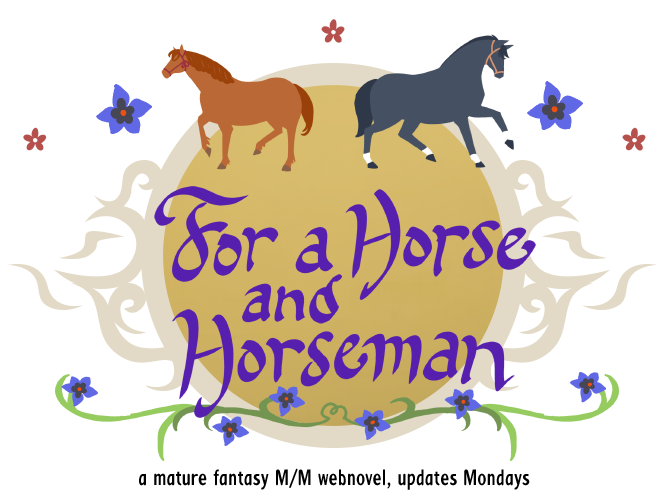
Chapter Fifty-Eight: Appreciative Audience
In Valcrest, Father’s idea of a good hunt had consisted of watching from the saddle as the hounds caught and mangled anything that moved. As a result, Osmund had always feared dogs growing up, and frankly falcons—though they were the symbol of the royal family—he mistrusted even more. He knew the Meskato were fond of both animals for the sport as well, an unfortunate cultural overlap.
But Cemil and his friends preferred the bow and arrow.
The Tolmishman held the large curved bow they’d given him awkwardly from his spot on oblivious Banu’s back, watching the other three as they took turns hitting the same tree from a distance. They’d showed him the basics, but he wasn’t eager to make a fool of himself. How had a stray comment to Cemil about missing Sakina (and the ever-elusive Emre) gotten him roped into this?
“The legend strikes!” Kemal hollered as Ayaz hit a single thin branch barely wider than his arrow’s point. “Won’t you leave the rest of us our dignity?”
“What dignity?” Ayaz yelled back, just a flash racing past with a mean grin. “You leave that at the door when you enter a room!”
Osmund had to admit, their form was impressive. The three Meskato elites aimed better at a gallop than a Tolmish longbowman standing still. The terrifying reputation of Meskato horse archers was well-earned.
It was soon clear that “hunting” was the excuse of these distinguished young gentlemen to pal around outside, and not, as was the case with Osmund’s father at least, to watch something suffer and die. He liked this version a great deal better.
(And perhaps, after all, he had been a little lonely.)
“Cemil, how is your ████ problem?”
Osmund heard this snippet as he returned to the others on their mat on the grass, trying to ignore the dead hare swinging from his hand. With the single arrow in its neck, he knew it hadn’t suffered. (He’d offered to make himself useful by retrieving the kills.) “No better than before,” Cemil was saying with a taxed expression. “We’ve had to start seizing all Tolmish ships for inspection, and now a powerful merchant lobby is accusing us of harassing a persecuted people as they flee an abusive regime. The barons in Videl are no doubt enjoying our misfortune.”
Osmund passed the rabbit to Ayaz, who was ready with a skinning knife. (Nearby, their mounts grazed.) “████?” Osmund repeated the unknown word. “What is that?”
“Fake money,” Ayaz explained. He pantomimed rubbing coins together in his bloodstained fingers. “Tolmish theckerils with low gold content are flooding the market. The exchanges are all in on it.”
Ah—counterfeiters. “What a mess…”
“You seem a good fellow,” Kemal said casually to Osmund. “Why are your countrymen such cheats?”
The Tolmishman didn’t know how to respond. He took a seat beside Cemil and started idly tending the cookfire they’d started. “This on top of the Videlari unrest,” Osmund observed glumly. “Little wonder you’ve been busy.”
“I regret you saw that disturbed woman when you came to the assembly the other day,” Cemil said as he rubbed down his bow. He was, consciously or otherwise, using his “prince” voice. “But the situation in Videl is caused by infighting. Displaced people naturally become desperate and blame anyone, though my family has played no part. It’s unfortunate, but nothing out of the ordinary.”
Osmund thought back to his history. Videl had long survived as an independent kingdom, but through force they had become vassals of the Meskato. That must’ve been ten years ago now; the fall of Videl had marked another Ocentine state lost to the “heathen” forces of the Empire. Still, they’d been allowed to preserve their beliefs, and even their right to self-government—to a point. It seemed the ruling barons were fighting over pieces of that remaining pie.
“The Videlari are never satisfied. Those Tolmish counterfeiters and the merchants concealing them are the bigger threat to your good name,” Ayaz panned. “Cemil, they’ll start calling you the dry prince on the streets of your own city before long.”
Osmund was visibly confused again, prompting another explanation. “The Tolmish Merchants’ Guild is throttling trade of beer and wine in protest of the investigation,” Kemal sighed. “Suddenly half the population of Şebyan—most of whom claim not to touch a drop of alcohol—are very invested in seeing this resolved.”
“I’m either a cruel tyrant harassing the Tolmish, or I’m a foreign sympathizer in bed with one,” Cemil grumbled. “These political opportunists frustrate me.”
Osmund was unnerved by the idea that his very existence had been making trouble for Cemil all this time, and he hadn’t even known about it. “Could I possibly help?” he offered. “If you need a native of the Isles to do some snooping, I could ask around and see what I find out.”
Cemil looked up from his work and frowned. “It would be dangerous, and you have no experience with the Merchants’ Guild, do you? Besides, I’d be a fool to send someone known to be one of mine.”
Kemal cocked his head thoughtfully. “Does anyone know his face outside the mansion, apart from your soldiers? It might serve to use someone you know you can trust.”
“I’ve never met a Tolmish who would relax his grip on his purse or his sword long enough to shake my hand,” Ayaz added. “They see us—us!—as backwards scoundrels.”
“It’s a bad plan,” Cemil said firmly, shutting down the debate. “Let’s say no more about it.”
It’s a terrible plan, Osmund agreed mentally as they skewered the rabbit and turned the meat over the fire. And for more reasons than Cemil understood! Pravin had those men looking for him. Hell, it was possible that Pravin—a very wealthy trader—was somehow involved in the scheme himself.
And yet. “I’m not talking about infiltrating the Guild directly,” he found himself arguing, attracting every eye to him, “but there must be some value in moving among the common folk. People gossip. And as Ayaz says, the Tolmish are prejudiced. You don’t know how noblemen speak of foreigners behind closed doors.”
“Is it any worse than the things we three Meskato are saying now? I don’t believe we peoples can be so different.”
“You afford them too much grace, my prince,” Kemal said affectionately. “Why not listen to your companion? He’s grown up among them, and chosen you.”
“…I’ll take it into consideration,” said Cemil, and this time Osmund knew not to push any further.
They started off back to the house at a steady trot as the evening grew long. “Apparently all of society in Inecalar is still in an uproar over the funeral,” Ayaz said, making conversation. His thick brows were always animated. “They say your father sent a representative to preside over the procession, and didn’t attend his own son’s rites.”
“Bayram was still an imperial prince. He was entombed with full ceremony at our family’s expense,” Cemil said tightly.
“Still, it’s a snub. All the people in the Empire know the Exalted Gate expects you to succeed.” The Exalted Gate, Osmund knew, was another term for the central government in the capital.
Cemil didn’t react. Perhaps he was wary of being told what he wanted to hear. “There’s still the matter of my other brothers. They’ll be ready with plots of their own.”
“You mean Safet?” Kemal snorted. “He’s just a boy whose mouth hasn’t yet formed a connection to his brain. Anyone with any learning can see how empty his grand promises are. Who would throw their weight behind him?”
“I’m sure there are many who’d prefer an idiot prince,” said Cemil.
People like Lord Pravin, for one, Osmund thought dourly. But if Safet really was a fool, hopefully that would make him easy to outmaneuver before he posed a threat. He couldn’t be worse than Bayram, anyway.
“Osmund,” Kemal called when the governor’s mansion had reappeared on the horizon. “We’ve all seen you can handle a horse as well as a Meskato, but you haven’t showed us your form on the bow yet.”
“What form? I told you all I’m here as an appreciative audience.”
Cemil rode up next to him. “Just one,” he coaxed. “Let them have their fun. They want to feel superior beside a total beginner.”
“We’re making sure you don’t miss out on an afternoon of sport.” Ayaz sounded the embodiment of innocence. “No one said you had to hit anything.”
“Yes, it’s about the body in motion,” Kemal said. He drew back an arm in imitation of a bowman’s posture. “Eye and hand together. Trust me, you’ll see the appeal. Soon, you’ll be terrorizing deer with the rest of us.”
Logic pointed to one conclusion: they wanted to have a laugh at his expense. But they’d been mercilessly ribbing each other all afternoon; Osmund found he didn’t mind the friendly jesting. “Alright,” he decided, raising the unfamiliar bow and nocking the arrow. (This at least he knew how to do from his lessons in the castle yard.) “Just so you’ll know once and for all I’m not being humble.”
He aimed for a tree stump nearly twenty yards off, and let the arrow loose. He’d overshot, and it hurtled a good way past its mark, nesting visibly in a patch of trodden grass—a testament to his lack of skill.
Cemil urged Anaya a step closer. He was raising his own bow. Osmund shook his head with a sigh. “I was aiming at the stump, believe it or not. It’ll be an easy shot for you.”
“That’s not Cemil’s style,” Ayaz said, grinning. “Watch.”
Perhaps he’s going to land it just next to mine, Osmund thought. That would be impressive. His own arrow wouldn’t look so silly sticking straight out of the grass like that, if it had a companion. But he was wrong again.
Cemil loosed his arrow, and it soared until it made contact with Osmund’s, shearing it neatly in half and knocking the fletching clean off. Osmund made an aggrieved sound. The men all laughed.
“Accept humiliation!” Kemal said. “Our prince is a cutthroat competitor. No one is spared.”
“There’s no need to be a showoff,” Osmund griped as he trailed after the rest of them back to the house. But for once, he didn’t feel like the butt of the joke.
One by one they led their horses back to the yard on the manor grounds. Osmund was wondering all the while whether he’d be expected to act as a stablehand for these noble gentlemen when they arrived, and so he didn’t notice the messenger right away.
He was dressed in a simple wool riding caftan, but his hat marked him as an emissary of the palace. (Osmund’s knowledge in this was greatly aided by Sakina’s romance novels.) Cemil instantly became a prince again, and moved to the front of them to accept the man’s burden—two scrolls, which were placed directly into his hand.
He gave the first a brief glance. Then he swapped to the other, pulling it open right there in front of them. Kemal and Ayaz stayed at a respectful distance, not breathing a word. Osmund followed their example.
After what felt like an eternity, Cemil turned. His face was inscrutable. “It’s from my father,” he said. “He’s coming here.”

